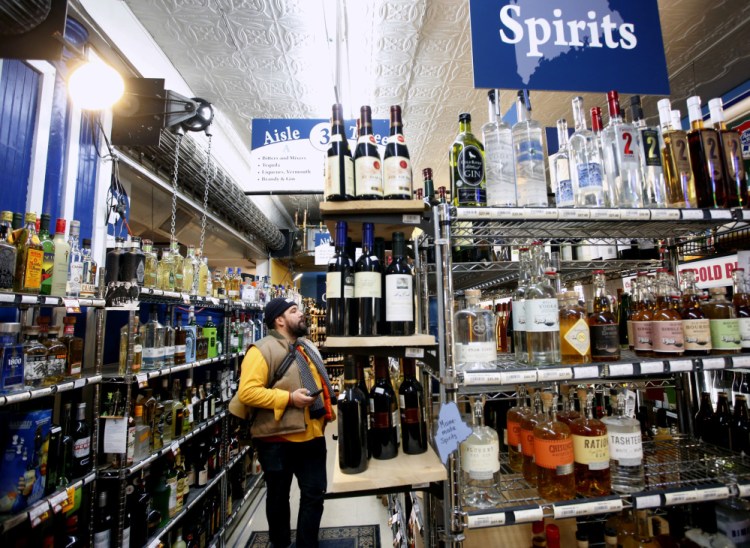If you need to replenish your post-holiday bar and like Tanqueray, wait until Feb. 1 to restock. That’s when many new prices take effect at state liquor stores, lowering the cost of a 1.75-liter bottle of Tanqueray by $2 but raising the cost of a 1-liter bottle of Grey Goose vodka by $1. As for Maine’s most popular liquor – Allen’s Coffee Brandy – the price for a 1.75-liter bottle will remain the same.
Consumers of hard alcoholic beverages in Maine will see lower prices at liquor retailers on a wide range of the state’s most popular spirits in February – along with a lesser number of increases – thanks to a decision by the state Bureau of Alcoholic Beverages and Lottery Operations to revamp the way it prices liquor products. The change is intended to simplify the way brands and sizes of alcohol are priced, and is similar to systems used in other states where the government sets liquor prices, said Tim Poulin, the bureau’s deputy director.
A majority of liquor varieties and sizes will not change. Of the 3,299 products sold in Maine, the prices of 2,044 will remain the same, 666 will decrease and 589 will increase.
For the state’s most popular alcoholic beverages, price decreases will outweigh increases in both the number of products and the average price change.
Among the 100 most popular spirits sold at Maine liquor stores, 23 will cost 50 cents to $2 less; 10 will cost 50 cents to $1 more; and 67 will not change in price.
At the top of Maine’s popularity list – determined by volume of sales – is the 1.75-liter bottle of Allen’s Coffee Brandy, which will not change from its current retail price of $19.99. However, the price of a 375-milliliter bottle of Allen’s will increase by 50 cents, to $6.49.
The state’s second-most-popular product, the 1.75-liter bottle of Orloff vodka, will cost 50 cents more, at $13.49. The state’s third-most-popular product, the 1.75-liter bottle of Captain Morgan spiced rum, will cost $1 less, at $28.99. Of the top 200 products sold in Maine, Bailey’s Irish Cream will get the biggest price reduction, a $3 drop to $44.99 for a 1.75-liter bottle.
The price changes stem from a new way the bureau determines the state’s gross profit from each sale. For the past three decades, Maine has negotiated the price markup for each alcohol product with the supplier on an individual basis, Poulin said. Suppliers have long wanted a more simplified system in which the markup is consistent across all alcohol varieties of the same type, such as a 750-milliliter bottle of premium vodka or a 50-milliliter mini-bottle of liqueur.
“They’ve been asking for it for a number of years,” he said.
The pricing change will initially benefit alcohol consumers and suppliers at the expense of the state. The total estimated cost to the state, based on sales during the 12 months ending Nov. 30, is $1.7 million, Poulin said.
However, he said, Maine officials expect to offset the revenue loss with “a continued aggressive pricing optimization on the brands that drive sales in our business.”
In other words, by being smarter about how the state sets prices on popular brands, officials believe they can reduce the number of shoppers who cross the border into lower-priced New Hampshire, where the pricing model is focused on lower margins and higher volume.
Still, the impending change is not an attempt to engage in a price war with Maine’s neighbor to the south, Poulin said.
“Their business model is completely different,” he said. “We’re not going to chase their tail.”
Liquor sales have been growing steadily in Maine over the past two years. For the 2015 fiscal year, which ended June 30, unit sales were up 4.9 percent over the previous year, Poulin said. Through December of the current fiscal year, they were up 4.4 percent from the year before.
“Additionally, our dollar sales are up over 6 percent over last year through December as well – all positive signs that we are doing all the right things to responsibly grow the spirits business in Maine and be competitive with New Hampshire,” he said.
Theresa Nessel, assistant manager and liquor buyer at Maine Beer & Beverage Co. in Portland, said the store is ready to make the wide-ranging price changes in February. She said state officials have been helpful in preparing retailers and answering their questions.
It remains to be seen whether Maine’s decision to change its pricing structure will benefit consumers and retailers in the long run, Nessel said.
“It could be a good thing for the state,” she said. “Time will tell whether it will be beneficial or not.”
Send questions/comments to the editors.





Comments are no longer available on this story